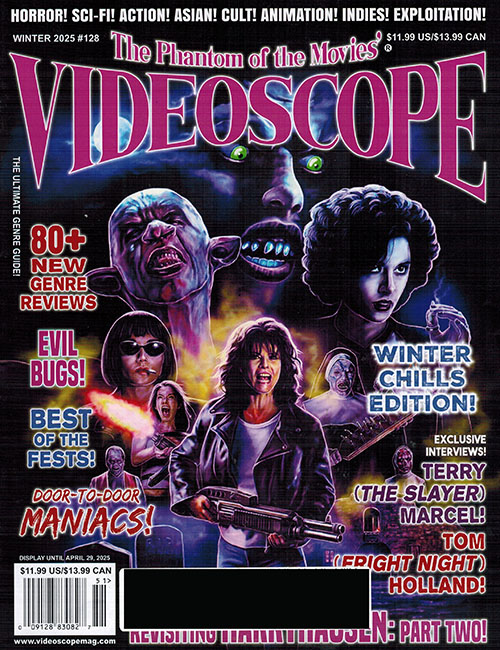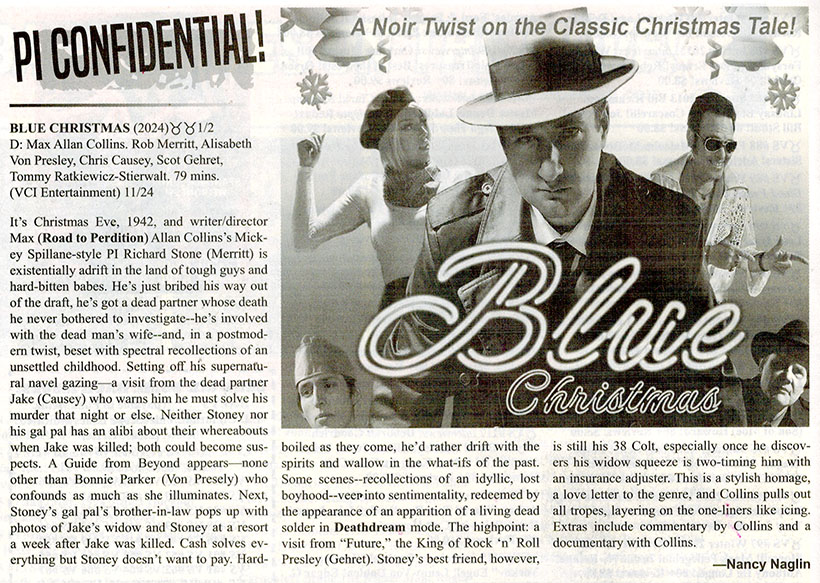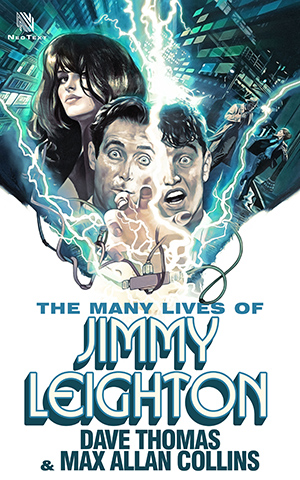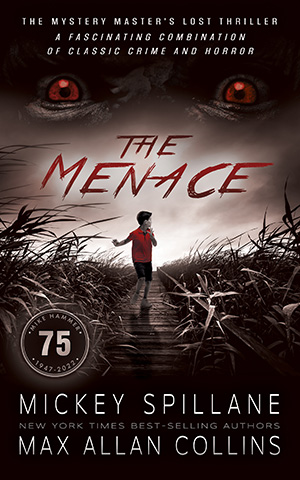I know I said I wouldn’t be talking about Blue Christmas again till next holiday season, but apparently I lied. My defense is that I hadn’t seen the nice review we got from one of my favorite magazines, Videoscope, written by editor Nancy Naglin herself. It’s on the stands now.


Nancy really seems to “get” our little movie, and it’s another of the overwhelmingly favorable reviews Blue Christmas has received, despite a handful of lumps of coal in our stocking. I should (or anyway will) mention that her observation of there being a sentimental aspect to the film is valid and whether that’s a bad or good thing reflects the way mileage can vary (as they say) among audience members. I like to think of it as “sentiment,” though, and not “sentimentality.”
I have a vivid memory of my late filmmaking friend Steve Henke commenting to the effect of, “Max does something wonderfully nasty overall and then ends with something sentimental and there’s nothing that can be done about it.”
Steve was a grizzled, gruff but fantastic collaborator who I once had to bail out of jail while a production was going. At risk of insulting his memory by getting sentimental, I will say his absence from the planet is one of the things that kept me from getting back into indie filmmaking for close to twenty years. Another collaborator I miss to a painful degree is actor Mike Cornelison, who starred in Mommy, Mommy’s Day, Real Time: Siege at Lucas Street Market, and Eliot Ness: An Untouchable Life, and who narrated both Caveman: V.T. Hamlin and Alley Oop and Mike Hammer’s Mickey Spillane.
The recent (and not officially released as yet) Death By Fruitcake is the only movie I’ve made recently that did not include any veterans from those earlier indie days. With the exception of my close pal and collaborator Phil Dingeldein, who was d.p. on Blue Christmas, the same was true of that production. (A notable exception on Fruitcake is the great Paula Sands, who appeared as herself in Mommy’s Day and as Vivian Borne in Fruitcake.)
There’s a moment in Mommy when Mrs. Sterling, who’s been committing murders, is about to book it out of town with her daughter Jessica Ann when the little girl complains about having to leave all her friends behind. To which Mommy replies, “You’ll make wonderful new friends, dear.”
And that’s true of both Blue Christmas and Death By Fruitcake (and Mickey Spillane’s Encore for Murder), which added a wonderful new raft of collaborators to my life, with a special nod to the versatile d.p./editor/producer Chad Bishop.
Collaboration has been an important part of my professional writing career, although at the heart of that career was my desire to control my work, to be in charge. I feared – with justification – that my personality and approach made taking the tempting path to Hollywood unwise. I made the decision to stay put – in Iowa – and just write my stories.
Not that writing fiction for a living doesn’t come with interference, but it’s minimal compared to what happens in the world of movies and TV. Wrestling with an editor or copy editor now and then is nothing compared to the problems Hollywood presents – the way money controls your ability to tell a story, and the crap you have to put up with from those who provide that money; the way directors can rewrite and screw up a script; the many uncontrollable factors including miscasting and all the other slings and arrows of the craft; and most of all the difficulty of getting anything produced.
I watched one of the greatest mystery writers who ever lived, Donald E. Westlake, who won an Academy Award for the screenplay of The Grifters, write seemingly countless scripts that generated option money but ultimately went into a drawer.
Throughout even a moderately successful career like mine you are fairly sure that any novel you write, unless you really miss the mark, can find a publisher.
And yet.
Collaboration is something I instinctively seek out. For years I wrote strictly alone, but at the same time I was playing music in my rock ‘n’ roll bands The Daybreakers and Crusin’, which were overflowing with talented collaborators, a list too long to get into. We got into the Iowa Rock ‘n’ Roll Hall of Fame with both bands, and had a national record that, however absurd, became something of a cult classic. Those years of musical collaboration – 1966 through 2024 – were concurrent with my fiction-writing career.
The loneliness of telling lies for fun and profit, as Lawrence Block put it, was further minimized by my collaborations on the Dick Tracy comic strip with Rick Fletcher and Dick Locher. Those collaborations had some ups and downs, but my long partnership with cartoonist Terry Beatty, co-creator of Ms. Tree and Wild Dog, among much else, proved particularly rewarding.
The same can be said of Matthew V. Clemens, with whom I wrote something like thirty novels, including (but not limited to) the bestseller Supreme Justice and its two sequels, plus our very successful series of CSI tie-in novels.

During the Covid lockdown I got the opportunity to collaborate with an SCTV favorite of mine, Dave Thomas, on a novel you may not have read (but should): The Many Lives of Jimmy Leighton. This one seems little known but I’m really, really proud of it. It’s a crime thriller with a science-fiction slant.
Most recently I have collaborated with Robert Meyer Burnett on True Noir: The Assassination of Anton Cermak, the ten-episode fully immersive audio production based on the first Nate Heller novel, True Detective. Rob directed an incredible cast incredibly well and this is also something I’m proud of. We haven’t got a Nathan Heller movie yet – Road to Perdition came close – but what Rob has created from my script is as good an example of effective collaboration as I can think of.
If any collaboration stands out, however, it has to be the one with my wife Barbara Collins – numerous short stories, a novella, two novels, and the Antiques series (aka The Trash ‘n’ Treasures mysteries), which are heading into their twentieth installment…there are more novels in that series than either Nate Heller or Quarry. To witness my smart, beautiful wife develop into a terrific writer is something I have experienced with great pride, often sitting on the sidelines, impressed. (And later this year I hope you’ll see just how well our Brandy and Vivian Borne have been transferred to the screen.)
Filmmaking is a special sort of collaboration, however, and on the indie level you don’t have the Hollywood baggage. It’s always been like going to summer camp for me (and I loved going to summer camp). I am well-aware that my skills as a filmmaker fall far less of what I like to think of as my mastery of fiction-writing, or even my years of playing rock ‘n’ roll for fun and money.
Being a competent film director, much less a good or great one, is one of the hardest trades that narrative storytelling can offer. I had no ambitions to be a film director – none. Never occurred to me. I wanted to write movies and have wonderful directors bring them to life. It’s happened now and then – Sam Mendes ain’t no slouch.

But mostly it doesn’t. Mostly scripts get written and wind up in a drawer, even if you’re Don Westlake…or Mickey Spillane, who had his heart broken by Hollywood and who died with several unproduced scripts among his papers (The Menace is a novel I fashioned from one of ‘em).
I became a director by necessity, when I had to take over Mommy after two weeks of a four-week shoot, which including reshooting much of what went before. When I completed the movie, worried that I hadn’t known what the hell I was doing, I binged on Alfred Hitchcock movies. Hitchcock is probably the greatest narrative storyteller in motion picture history. I kept watching those movies and being relieved when I saw Hitch doing things similar to what I had done (not talking about content here, but putting pieces of film together into an effective narrative – editing well, like in a novel but completely different).
I am well aware that I started too late to reach in film the level that my fiction-writing has, I think, achieved – writing fiction is a craft I started working at learning when I was in junior high and high school, sending novels to publishers who (thank God) kicked them back to me.
But I love movies as much as I love novels, in some ways more, and they ultimately yanked me in, like Michael Corleone in Godfather 3 (nobody seems to like that movie but everybody remembers that line, possibly second only to “An offer you can’t refuse” in the original film).
Filmmaking has an irresistible pull for me and many other sorry souls. Stephen King said it best, although I’m paraphrasing: “Movies are the most expensive, least efficient way of telling a story; but, unfortunately, also the coolest.”
Am I done with indie filmmaking? I’m still thinking, talking, hoping (Barb has had her fill). Several things are cooking, but the bigger ones probably need a director younger than me. If they stick to the script, I’ll be fine with that.
Which is the problem. My first produced script, The Expert, had a star who seemed to have read the script once and then tried to remember it, and a director who either walked off or was fired (I’ve never found out which) from the production late in the game. The Last Lullaby had a “co-writer” foisted on me who I never met and who rewrote my screenplay, though I did provide revisions that brought it back closer to what I had in mind. Still. I did one script for the Quarry series that got disassembled and spread between two episodes, stitched together like the Frankenstein Monster and about as attractive.
That kind of collaboration? I can do without.
And it’s why I made two micro-budget movies on my own terms.
Here’s a smart review of the sixth (and final) Titan collection of Ms. Tree.
This is a nice if brief YouTube piece on the writing of Road to Perdition, both graphic novel and film. It answers the question of who wrote which, but is unaware that a playwright friend of director Sam Mendes from the UK did an uncredited rewrite.
Here’s another piece on the film of Road to Perdition focusing on Tom Hanks (and somewhat on Daniel Craig).
The day this appears I will be working with Phil Dingedein at dphilms in Rock Island shooting the final episodes of History Behind the Mystery, each of which drops on YouTube in tandem with the episodes of True Noir.
M.A.C.
Tags: Antiques Series, Barbara Allan, Blue Christmas, Caveman, Death by Fruitcake, Death by Fruitcake Movie, Eliot Ness An Untouchable Life, Mike Hammer's Mickey Spillane, Mommy, Mommy's Day, Ms. Tree, Ms. Tree: Fallen Tree, Real Time: Siege at Lucas Street Market, Reviews, Road to Perdition, Trash 'n' Treasures
Blue Christmas got me in the gut. You guys did an inspired job, especially given the circumstances.
And I hope you get to collaborate with more filmmakers who respect your writing.
Thanks for this supportive, thoughtful commdng, Ayz.
No worries at all. Appreciate your passion. It’s inspiring.